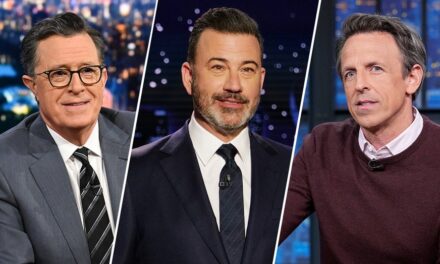Bill Maher, the well-known comedian and host of HBO’s “Real Time with Bill Maher,” recently delivered a monologue that has ignited a firestorm of criticism among liberal audiences. During the episode in question, Maher discussed a recent meeting involving former President Donald Trump, highlighting aspects that he deemed positive. This commentary quickly became a flashpoint for heated discussions online, drawing a sharp divide between Maher’s perspective and that of many of his liberal viewers.
The event that spurred Maher’s remarks was a gathering in which Trump reportedly showcased certain behaviors and policies that Maher characterized as surprisingly agreeable. While this meeting certainly surprised many of the former president’s critics, Maher’s analysis was met with mixed reactions, particularly from those who identify strongly with liberal values. In his monologue, Maher emphasized the importance of not entirely dismissing someone simply due to their political affiliations, a viewpoint that left many feeling unsettled.
Maher’s approach to discussing Trump can be seen as both daring and controversial. He has always spoken candidly about the political landscape, often pushing the boundaries of typical liberal rhetoric. His latest comments on the Trump meeting served to reinforce his self-portrayal as a provocateur, someone willing to entertain different ideas even if they clash with conventional liberal doctrine. This is consistent with Maher’s overall style, where he often claims that humor can bridge divides that politics cannot.
In his monologue, Maher pointed out specific moments from the meeting that stood out to him, noting Trump’s charm in certain interactions, and what he interpreted as efforts to unify rather than divide. “There was a moment,” Maher recounted, “when I actually found myself relating to him. Can you believe that?” This confession was met with gasps and laughter from the audience in front of him, indicating a mix of disbelief and curiosity about his perspective.
However, it did not take long for his comments to circulate widely across social media platforms, triggering backlash from many liberal commentators and fans of Maher who felt betrayed by his apparent neutrality towards Trump. Critics argued that it is irresponsible to focus on positive aspects of a figure who many believe embodies division and controversy. Numerous tweets and posts expressed disappointment, with users emphasizing Maher’s role as a comedian who should not lend credence to Trump’s legacy.
The backlash against Maher’s commentary raises essential questions about the role of humor and politics in contemporary society. Can comedians, like Maher, afford to engage with individuals who are considered harmful by significant segments of the population? Or does entertaining such viewpoints equate to normalization? These dilemmas reveal the complexities of modern discourse and indicate that Maher’s perspective is part of a broader conversation unfolding within liberal circles.
Further complicating the issue is Maher’s reputation as a political commentator who navigates leftist and centrist ideologies. He is renowned for his frank discussions about political correctness, identity politics, and social justice, often pushing back against dogmatic positions on both sides of the aisle. Yet, his willingness to acknowledge any merit in Trump’s behavior feels contradictory to his established stance on many issues, leading some followers to question where his true convictions lie.
Supporters of Maher contend that his criticisms of Trump are still valid, arguing that he is simply attempting to illustrate the complexity of human interactions and political figures. They assert that acknowledging the good in others—even those as polarizing as Trump—does not equate to complicity in their misdeeds. This prompting of a nuanced dialogue can help bridge the chasm that divides liberals and conservatives, they argue, creating space for more fruitful discussions.
What Maher’s comments did was shed light on a deeper philosophical debate regarding bipartisanship and cooperation in politics. While Trump’s presidency was marked by tumultuous events and highly partisan politics, Maher’s suggestion to seek out the “good” presents a challenge to the seemingly entrenched attitudes that define today’s political landscape. Advocates for greater political civility argue that by finding areas of agreement, it becomes possible to move forward, even if the foundation of that agreement is shaky or arising from fundamentally different beliefs.
As discussions around Maher’s monologue progressed, many began to dissect the nature of celebrity influence in politics. Figures like Maher wield significant power over public opinion; as such, every word counts. Critics fear that Maher’s casual dismissal of the severity of Trump’s actions risks trivializing issues such as racism, sexism, and other forms of discrimination that many attribute to Trump’s rhetoric and policies. Hence, the pushback from liberals may stem from a desire to protect the values they hold dear, making Maher’s comments particularly provocative.
As the dust settles around Maher’s remarks, it becomes clear that this debate isn’t simply a reflection of one comedian’s views; it highlights a broader reckoning within left-leaning politics on how to engage with opposition without compromising core principles. His monologue serves as a critical entry point into larger discussions about identity, accountability, and the nature of political dialogue. In a landscape where polarization reigns, the ability to have honest and constructive conversations is more vital than ever.
Moreover, this incident has reignited discussions among political analysts regarding the effectiveness of humor as a tool for political discourse. As comedians like Maher tread the fine line between entertainment and serious commentary, their influence continues to spark conversations on the moral responsibilities that accompany public platforms. The aftermath of this particular monologue will likely unfold for weeks to come, as similar incidents in the future will be scrutinized with the context of this controversy firmly in mind.
In conclusion, Bill Maher’s recent monologue about a positive Trump meeting created a cascade of reactions across the political spectrum, particularly among liberals who feel protective of their values. As laughter and discomfort intertwine, Maher’s perspective challenges audiences to engage in difficult conversations about politics without succumbing to divisive rhetoric. As the political landscape continues to evolve, the questions raised by his comments will remain relevant: how can we cultivate dialogue that respects differing view without sacrificing integrity? Moving forward, the quest for balanced, respectful political engagement will remain an enduring theme in American discourse.
































